ISSN 2410-5708 / e-ISSN 2313-7215
Year 8 | No. 22 | p. 126 - p. 144 | June - September 2019
© Copyright (2019). National Autonomous University of Nicaragua, Managua.
This document is under a Creative Commons
Attribution-NonCommercial-NoDerivs 4.0 International licence.
The entrepreneurial culture in the Nicaraguan university
https://doi.org/10.5377/torreon.v8i22.9030
Submitted on November 8th, 2019 / Accepted on November 26th, 2019
PhD. Sandra del Carmen Dávila Flores
PhD. in Management and Quality of Education
Universidad Nacional Autónoma de Nicaragua, Managua. Faculty of Education and Languages
https://orcid.org/0000-0003-0784-9683
sdavila@unan.edu.ni / davilafloressandra@gmail.com
Keywords: culture, entrepreneurship, entrepreneurial culture, strategies for change and improvement of the entrepreneurial university.
Abstract
This research addresses the issue of entrepreneurial culture at the National Autonomous University of Nicaragua, Managua (UNAN-Managua). Some aspects taken into account were: the conception of culture, the definition of entrepreneurship, the identification of the resistance elements, as well as the motivation present in the academic context for the improvement and constitution of an entrepreneurial university. As part of the methodology used, different techniques and instruments were applied such as: Interviews with authorities and key actors that were linked to the promotion of entrepreneurship; Focus groups aimed at professors of various faculties who attended the axis of professional and research practices; Survey addressed to professors and students of all the Faculties and Institute of the UNAN-Managua.
After doing this work it can be said that, to develop the entrepreneurial culture it is necessary to implement a process based on collaboration, taking into account the conceptions, expectations and attitudes of the members of the organization. As part of the prioritized strategies some of them are: the systematization of experiences and good practices within the teaching departments of the Faculties and Institutes that serve as an example for others where entrepreneurial actions are insufficient or void. On the other hand, the coordination with external actors for academic and technological transfer that contributes to a change and improvement in university management, in such a way that it contributes to reflection and action on the present and future of the university with a view to becoming in an institution with greater multilateral action at the national level, which allows it to approach the business world and public administration through the offer of academic resources and services based on the social needs and demands that lead them towards university accreditation and internationalization.
Introduction
The global and national context is undergoing constant variations, in the business field the economic future is not clear, in public administration the demands are increasingly complex, and therefore, the actions that contribute to improving productivity and competitiveness remain one of the priorities for the academic instances.
Within the framework of the 2030 Agenda as an action plan in favor of people, the planet, prosperity and contributing to peace, it is recognized that, for the eradication of poverty in all its forms and dimensions, including extreme poverty, the biggest challenge facing the world and constitutes an indispensable requirement for sustainable development is Objective 4: Ensure quality inclusive and equitable education and promote lifelong learning opportunities for all. (Resolution approved by the General Assembly, 2015). Education is conceived from this point of view of Development and should be considered as a priority task for universities that contribute to the creation of awareness, implementation of strategies that improve the professional training of citizens of the country and the planet.
Casco (2015) considers that in the background there is a great tide that is moving and that brings new labor relations and new roles in the production of goods and services, new formats of worker and entrepreneur, sometimes with interchangeable and complementary roles ( Now I am an entrepreneur, now a worker-collaborator, then an employee ...). This movement makes obsolete the historical understanding of class struggle, mercantilism, labor relations, regulatory agencies and laws. Increasingly, one should lead to reflection and ask ourselves: How do we prepare our students for positions where it is not possible to directly teach the skills that are required? How do we prepare our students for positions that are not yet planned? How do you strengthen a value system that contributes to citizen awareness? How do we reduce the multiplicity of occupancy gap in sectors that are already saturated? How do we conceive a university education that develops entrepreneurial skills for life? How do we prepare for a university towards accreditation and internationalization?
It is evident that the university is facing a series of actions in the institutional management that will have to influence the programming models, changes in the degrees, changes in the institutional organization and in the training system that leads to greater links with the environment, integrate transformations linked to Information and Communication Technologies, as well as improving the coherence of organizational processes and enhancing the role of managers as change managers. (Castro, 2017). The development of an entrepreneurial culture invites members of academic institutions to be able to think together, encourage more dialogue in different academic spaces, and obtain an exchange of knowledge and feelings, necessary inputs to form conscious authorities, committed teachers and entrepreneurial students of life and for life.
Framework
Culture as an agent of change of an organization.
From the different schools the concept of culture and its impact on organizations has been analyzed, then a description of them is presented. (León, 2002).
Table 1: Schools and application to culture
|
Schools |
|||
|
Functionalist school: Malinowski • Definition: Instrumental device that allows a person to face specific problems to meet their needs. The main manifestations of culture are explained in reference to basic needs. |
Structuralism / Functionalist School: Radcliffe - Brown • Definition: Construction of mechanisms by which an individual acquires mental characteristics (values, beliefs) and habits that allow him to participate in social life. Culture also influences social structures to maintain an orderly social life and adaptation to the physical environment. |
Adaptive Ecological School: White, Service, Rappaport, Vayda, Harris • Definition: System of socially transmitted behavior patterns that serves to interrelate at Human communities with their ecological environments, through a process of feedback and reciprocal causality. |
Historical School: Boas, Benedict, Klukhohn, Kroeber • Definition: Culture is conceived as a product of Historical processes and circumstances. |
It shows a classification of Schools and their application in culture (León, 2002).
In recent years, the topic of entrepreneurship has been resumed by several actors who propose the need to approach it from a cultural, holistic and integral perspective in the formation of the individual.
Entrepreneurial University Models
From the public institutions the idea of entrepreneurial culture includes both the ability to induce changes and the ability to welcome, support and adapt to changes due to external factors. Because reality is changing, society has woken up because its environment falters and wakes up in search of solutions, solutions that come hand in hand with innovation in the use of available resources (few or many) to get a solution (Mair and Martí, 2006, p.41).
Table 2: Models of Castro, Barrenechea, and Ibarra University (2011, p. 209)
|
Traditional university |
Entrepreneurial University |
Relational University |
|
Teaching |
Teaching articulated to competencies oriented towards business entrepreneurship. |
Teaching articulated to competencies oriented towards the sense of initiative and entrepreneurship. |
|
Non-oriented research |
Market-oriented research (companies) |
Knowledge oriented to the context of economic, social, cultural and regional application |
|
University Management (Hierarchical, bureaucratic and parceled) |
University Management (hierarchical, bureaucratic and instrumentalized by business management) |
Governance: horizontal and network management (social knowledge management: articulation of resources, individuals, organizations and local and global knowledge agendas). |
|
Evaluation with endogenous criteria to the Academy |
Evaluación con criterios endógenos y orientados hacia el value for money. Evaluation with endogenous criteria and oriented towards value for money. |
Relational quality: integrated multilevel process (individuals, groups and networks), multicriteria (quality, connectivity and social relevance) and multiagent (academic peers, users and social peers). |
|
University extension |
Promotion of the relationship University company |
Promotion of heterogeneous networks of knowledge and learning. |
The three university models that coexist in practice (traditional, entrepreneurial and relational) are synthesized.
According to Sánchez, (2017, p. 460) academic institutions play a role in promoting entrepreneurship, given that:
Entrepreneurial education is, presently, a reality in constant progress. This contributes to the formation of a culture (starting with the youngest and children); boosting these entrepreneurial attitudes and capacities, society benefits, even beyond the application of these to new business initiatives, this in the European Union and strongly begins in Latin America. In this regard, it proposes that an academic entrepreneurship program must contemplate entrepreneurial attitudes, skills and competencies, in order to develop the qualities required to create new demands in university professions.
Entrepreneurship in academic fields requires the application of a series of methodologies that lead individuals to be protagonists of their own changes and that of their environment. In this sense, Fayolle and others (2006) characterize this entrepreneurial educational process through different types:
• Educate about entrepreneurship
• Educate to undertake
• Educate through entrepreneurship (Action-based)
In addition, to these, Liñán (2004) formulated different types of entrepreneurial education programs:
• Education to raise awareness
• Education to Start-Up
• Education for entrepreneurial dynamism
• Continuing education for entrepreneurs
Table 3: Characteristics of entrepreneurial universities according to the European Commission (2012), Thorsp & Goldstein (2010) and Maribel Guerrero (2015).
|
European Commission and OECD LEED Forum |
Holden Thorsp & Goldstein |
Maribel Guerrero |
|
Leadership and governance |
Recognizes that liberal arts education has contributed to American innovation |
Organizational adaptability to environmental changes |
|
Organizational Training for People and incentives |
It feeds on big problems |
Distinctions between governance and management |
|
Entrepreneurial Development in education and learning |
Value innovation and execution |
Activities aimed at the development of entrepreneur culture (Kirby, 2002) |
|
Networks for entrepreneurs |
It puts culture on top of structure |
Contribution to economic development with the creation of new businesses (Chrisman and others, 1995) |
|
External relations with companies for knowledge exchange |
Promotes relationships between academics and entrepreneurs |
Marketing of investigations (Jacob and others, 2003) |
|
Internationalized Institution |
||
|
Measure its impac |
Synthesis of the characteristics of the university that prioritize entrepreneurship within their work plans. Bikse, Lusena- Ezera, Rivza, Volkova (2016).
Methodology
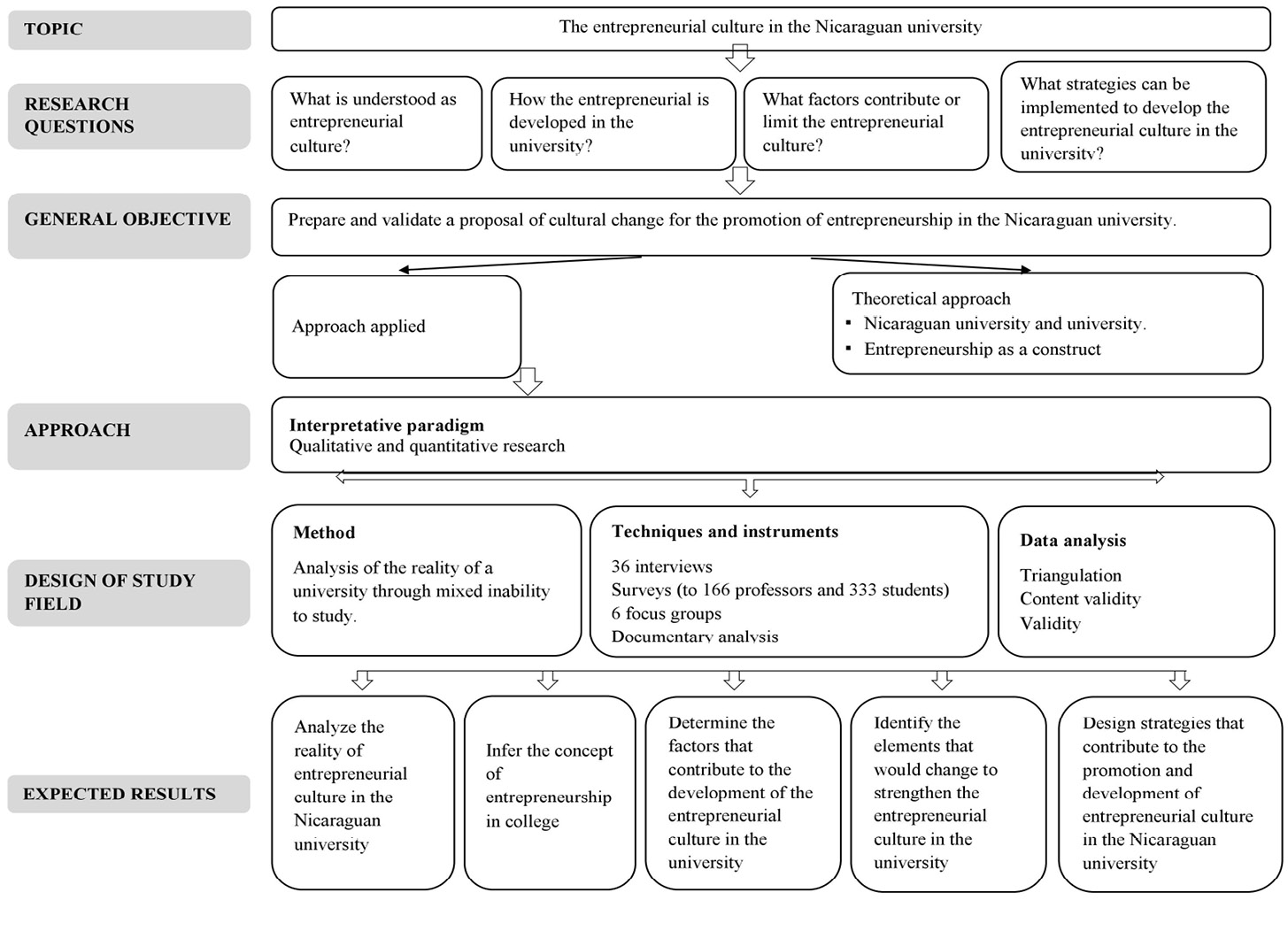
Results
According to the proposed objectives the results are presented below.
Results of objective No. 1: Infer the concept of entrepreneurship in the university.
Teachers state that entrepreneurship as the first one, that entrepreneurship is linked to a process of cultural transformation; Second, to the development of a personal attitude; Third, to concrete projects and initiatives and fourth, to business and economic development. Several authors agree that entrepreneurship is linked to cultural transformation processes Römer (1990), Gutiérrez (2006), Guzmán and Trujillo (2008) and Galtés (2011). The students agreed that the first factor that defines entrepreneurship is related to the processes of cultural transformation, followed by personal attitude and the development of concrete projects and initiatives and finally with economic development. Although the data selected by the students are related to that of the teachers, it is important to mention that the students give a higher percentage of their personal attitude and the development of concrete projects and initiatives.
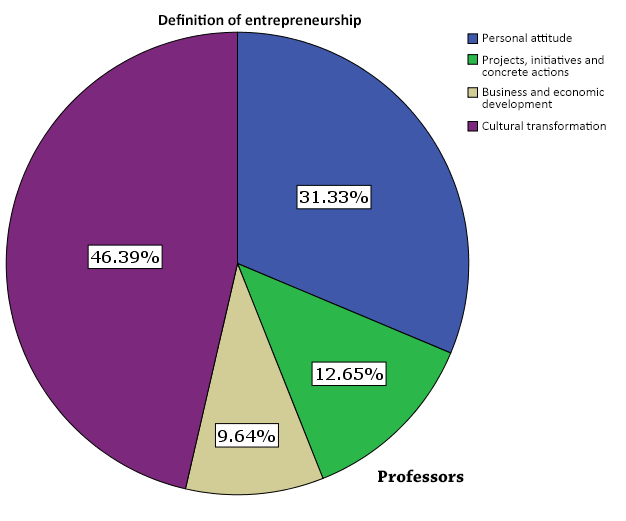
Figure No. 1a: Definition of entrepreneurship. Own Authorship
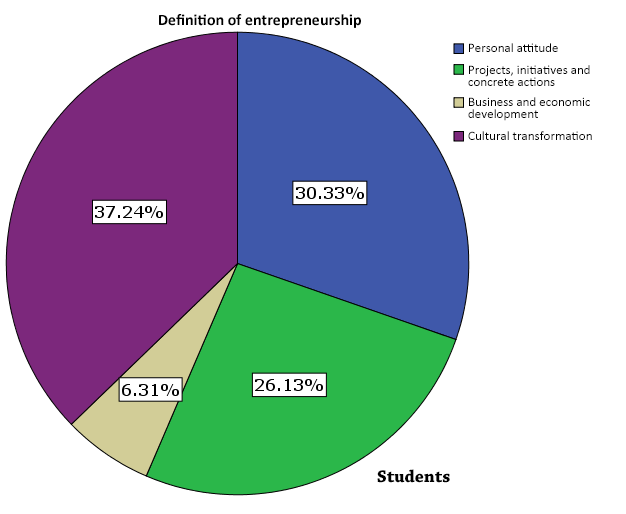
Figure No. 1b: Definition of entrepreneurship. Own Authorship
As a result of this research, it was identified that a University requires related actors who feel, live and promote entrepreneurship at all levels. Therefore, they defined other concepts such as:
• Entrepreneurial leader
• Entrepreneurial teacher
• Entrepreneurial student
• Entrepreneurial University
Results of objective No. 2: Analyze the reality of organizational culture in the Nicaraguan university.
Some of the elements presented in the theoretical foundation of the types of culture highlighted three types: a) bureaucratic culture b) permissive culture and c) collaborative culture various authors conceive that to strengthen the entrepreneurial university it is necessary to create or strengthen a collaborative culture, between those that can be mentioned Brown (2004) and Lazati (2015) that state that an academic institution must promote the work for consolidation and sustainability of the processes. In the case of teachers, they stated that a collaborative culture is promoted at UNAN-Managua, while the students felt that the type of culture that predominates in the university is bureaucratic and permissive.
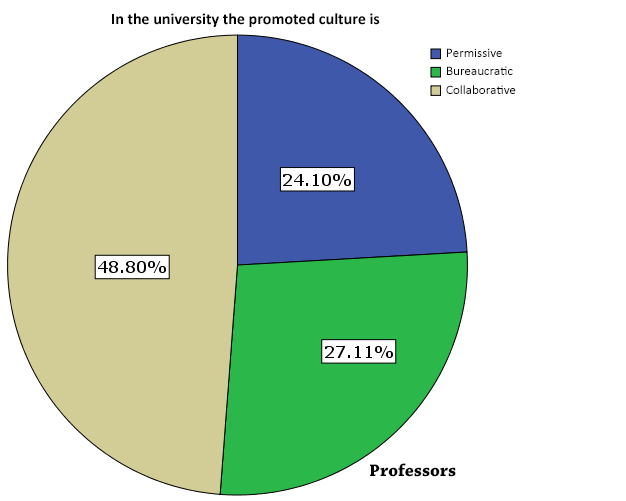
Figure No. 2a. Types of culture. Authorship
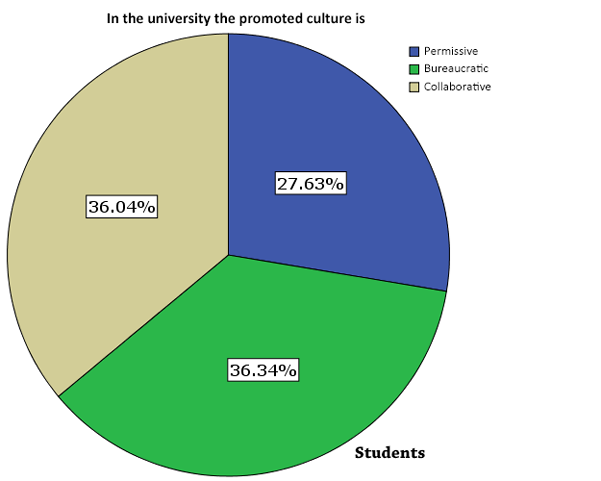
Figure No. 2b. Types of culture. Authorship
Organizations are like a system, and it is not only enough to establish theoretical postulates if they are not related to those of their natural performance, that is why organizations are conceived as socio-cultural systems, their ideational components (their collective schemes of meanings and values, their knowledge and belief systems) merge and cannot be dissociated from their structural component, thus forming an integrated whole, according to a holistic conception of the organization (Montealegre, 2006).
Decision making at UNAN-Managua.
For the decision-making process, three organs were identified: the Rector’s Office, the Labor Unions and the University Council. In the case of professors, they consider that decision-making is carried out through the University Council as the highest body of legislation as set forth in the University Statutes. On the other hand, students value that the Rector is the highest decision-making body.
At present, UNAN-Managua has been working on strengthening strategies to ensure quality university management, therefore, continuous improvement is part of its strategic objectives and is in accordance with the Mission and
Institutional Vision In other words, “... if a manual of procedures is responsible for describing in detail, and emphasizes at each step of a particular activity, then, that document becomes very relevant for people belonging to an organization.” (Vivanco, 2017). UNAN-Managua has been making progress in the approval of documents that contribute to the management and administration of the educational organization in which the governing bodies are determined both at the collegiate level and at the individual level. This allows the institution to determine its scope, goals and objectives at different levels.
Values
According to the teachers’ perception, the values that they identify as keys for promoting entrepreneurial culture at UNAN-Managua are:
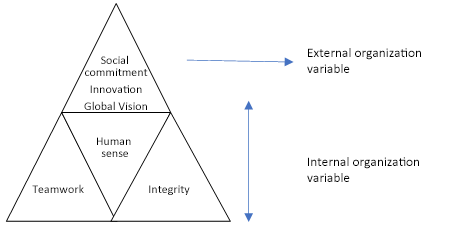
Figure 3 Selected values, according to teachers, Authorship.
Instead, for students they establish:
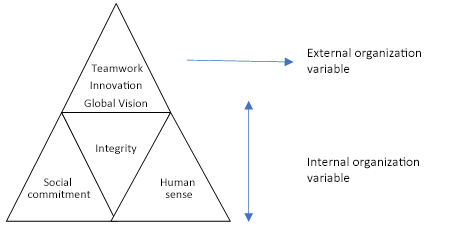
Figure 4. Perception of values, according to students, Authorship.
It can be deduced that both results highlight the importance of values such as integrity, social commitment, human sense and teamwork. According to Bernal (2014), he states that:
“One of the great opportunities in the educational field is that entrepreneurship contributes to the development of moral values, such as perseverance, responsibility or the value of choosing; to intellectual values, such as the ability to plan, carry out and critically evaluate projects; and social values, such as cooperation, teamwork or leadership capacity ”(p.387).
In this sense, it is required that the houses of higher studies promote human values from the classroom that affects all the scenarios of life, conceived from “the planned, intentional, oriented and controlled action of the family, the school and the community through personal example in the actions of adults responsible for the social order of the formation of new generations” (Baxter, 2009). During the process, new proposals emerged in the list of values such as: peace, equity, equality, solidarity, ethics, honesty, relevance and communication.
Recently the National Council of Universities opened the “University for Peace” program as an initiative of higher education institutions, it aims to promote the culture of peace and reconciliation, through values, respect and love of life, in addition to create comprehensive training spaces for common welfare. (UNAN-Managua, Maleaños, 2019). .
Results of objective No. 3: Determine the factors that contribute to the development of the entrepreneurial culture in the university.
As one of the potential factors is the need to contribute to the socioeconomic stability of the country. Another is that UNAN-Managua in recent years has approved a series of normative instruments for the promotion of entrepreneurship such as the Statutes and their Reforms, Educational Model, the Strategic Plan and the Annual Operational Plans at the level of Teaching functions and Investigation. The university has also been providing student initiatives through competitive funds. Similarly, the existence of the Innovation and Entrepreneurship Commission is another potential factor identified by teachers and authorities. Similarly, the integration of entrepreneurship into the curriculum of the subjects of the research axis represents an opportunity to develop methodological strategies that contribute to the personal and professional development of individuals in order to develop their initiative and strengthen their employability.
Another positive factor is that in UNAN-Managua, multidisciplinary integration projects have been promoted mainly between careers of the same Faculty, and others between Faculties such as Medicine and Science and Engineering. Another potential element that stands out at UNAN-Managua is the creation and approval in 2017 of the academic offer at grade level with the Bachelor of Education Sciences with mention in Innovation and Entrepreneurship of the Faculty of Education and Languages, the areas Training innovation, entrepreneurship, information technologies and pedagogical components. In Nicaragua, it is the only institution that has this career with this specialty, future professionals will be the experts in teaching the subject of
“Education to learn, undertake, prosper.” It was also expressed that academic offers are developed at the graduate level with the interest of raising the quality of scientific-academic training of professionals, with emphasis on creativity, innovation and entrepreneurship.
The Government of Unity and National Reconciliation, at the end of 2016 created the Program Educational “Learn, Undertake, Prosper” with the purpose of changing attitudes in improving the quality of life of Nicaraguans through the harmonization of the educational subsystems MINED, INATEC and CNU. Also outstanding are extracurricular actions, advice on entrepreneurial ideas and other initiatives developed by UNAN-Managua were positive elements that stood out.
Therefore, the different initiatives developed by the university in entrepreneurship are relevant elements to strengthen an entrepreneurial culture, since the university, in addition to training people who will occupy established jobs, must train those who seek to research, innovate, create and undertake their own projects to transform them into new sources of employment, innovating processes, products or services that solve problems or needs of society (Soto 2012). As part of the results it was found that teachers and authorities significantly value the actions developed by the University in recent years, however, it is necessary to expand it to all faculties and areas of the university.
Results of objective No. 4: Identify the elements that would change to strengthen the entrepreneurial culture in the university
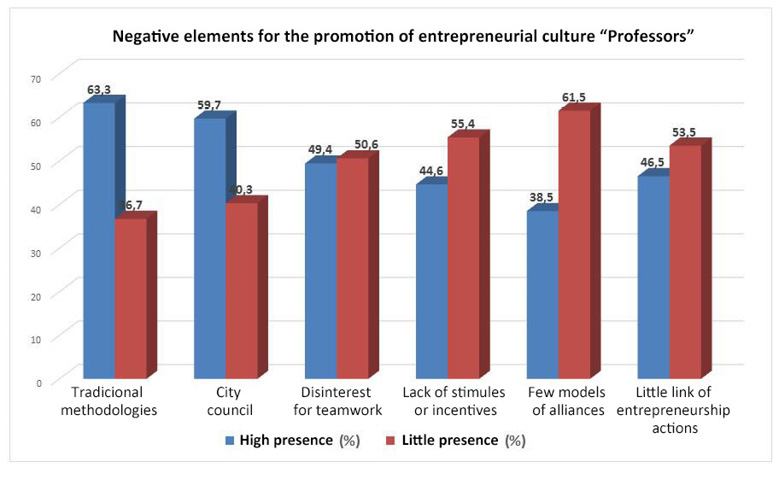
Figure No. 5a. Negative elements for the promotion of entrepreneurial culture. Authorship
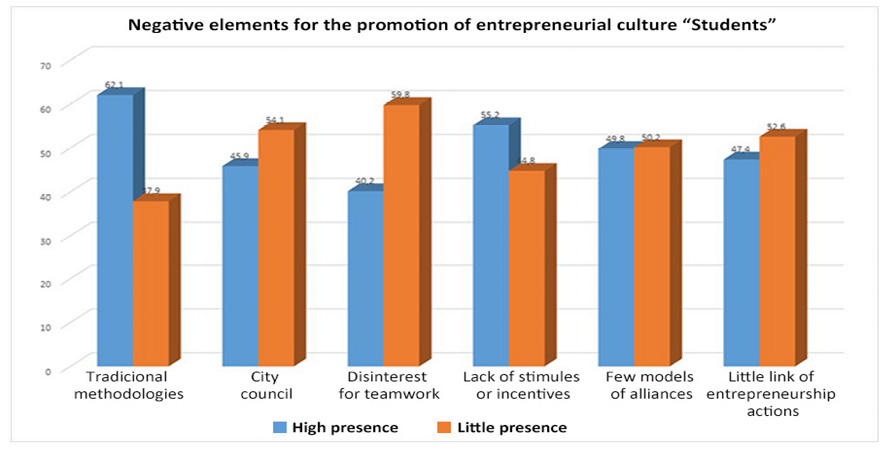
Figure No. 5b. Negative elements for the promotion of entrepreneurial culture. Authorship
The following factors were identified:
• Traditional methodologies
• Entrepreneurship is conceived as a conjunctural issue.
• Disinterest in teamwork.
• Little link to entrepreneurial actions.
• Lack of stimuli and incentives.
• Few models of alliances.
Results of Objective No. 5: Design strategies that contribute to the promotion and development of entrepreneurial culture in the Nicaraguan university
The prioritized strategies for the development of an entrepreneurial culture were:
Table 4. Strategies prioritized by teachers and students. Authorship
|
Order of Priority of strategies |
Professors |
Student |
|
First |
Partnership models |
Extracurricular activities |
|
Second |
Extracurricular activities |
Partnership Models |
|
Third |
Teacher training |
Stimuli and incentives |
|
Fourth |
Stimuli and incentives |
Awareness plan |
|
Fifth |
Awareness plan |
Teacher training |
Priority actions are linked to the socio-economic context where professional practice is put into practice. Therefore, to promote an entrepreneurial culture, it will be necessary to create conditions both internally and externally, where the participation of all members of the educational community is promoted. In other words, Parada, Batista and León express that:
“Quality in universities is defined through its culture and strategic projection; it is ultimately an evaluative view, defined by the community as a whole (teachers, students, researchers, authorities, administrative and service personnel and pedagogues) that reflects on the practice and thus legitimizes the instrument that allows to “improve” the institutions, so, it will tend to continuous improvement and the best performance of the processes and results of its activities, in order to fulfill its social order.” (2018, p.826).
Conclusions
After having carried out this research, the following conclusions have been reached: The term entrepreneurship is associated with the change in the ways of thinking and acting that contribute to improving personal and environmental life forms. However, entrepreneurship is still conceived as a purely economic activity. On the other hand, they associate the action of Entrepreneurship with unlearning traditional models to envision the future, and in each of the definitions they associate both internal and external characteristics at the entrepreneurship level. Concepts of entrepreneurial University composed of entrepreneurial leaders, entrepreneurial teachers and entrepreneurial students were defined.
In epistemological terms the development of a collaborative culture is perceived, however, at the axiological level the bureaucratic and permissive culture are those that mostly relate to the practice in the different organizational stages. However, there is an interest on the part of all the members of the organization to establish teamwork, fluid communication, and clear guidelines for achieving strategic results in all its manifestations. This is integrated with greater availability in small groups and is expressed in inter-institutional work commissions. The university is in a generational transition that integrates a set of paradigms that will be formed throughout its trajectory, they will be influenced by the members of the organization, their structures, strategies, systems, capabilities, skills, styles, processes that will influence significantly in their environment and learning environments.
In the decision-making process at UNAN-Managua there is a regulation that determines the bodies of collegiate and unipersonal governments. In the case of teachers, the University Council. On the other hand, the students perceive the Rectorship as top decision makers, which gives a level of recognition and expectation to the work of those who carry out these positions. Greater involvement of teachers and administrative associations is demanded.
Key values are identified for the entrepreneurial university such as: human sense, teamwork, integrity and social commitment. Innovation and the global vision were the least important. Others were identified as peace, equity, equality, solidarity, and ethics. In essence they are conceived as a philosophy that demarcates organizational thinking and acting, they represent them as a basis of principles and ideals of culture and humanism for all aspects of the Nicaraguan university and society.
A series of motivational factors that contribute to the development of an entrepreneurial culture were identified. Among the main elements of resistance that were identified in terms of teachers in the organization, in order of prevalence, they are: the use of traditional methodologies, entrepreneurship conceived as a circumstantial issue, disinterest in working in teams and manifesting themselves through of groups that do not want to change, those who believe that entrepreneurship is a fad and those who are aware that it must be changed. They also evidenced the lack of stimuli and incentives for entrepreneurial action and few models of alliances that develop actions for the exchange of alliances with key socio-economic actors linked to the career, as well as activities in the environment and the integration of technologies for promotion of entrepreneurial culture.
Teachers consider that the priority actions for the promotion of entrepreneurial culture, in order of priority, are: the implementation of alliance models, the development of extracurricular activities, teacher training plan, recognition through stimuli and incentives and the awareness plan at the university level. In correspondence with what was expressed by the students, the development of extracurricular activities, the implementation of alliance models, the development of stimuli and incentives, the awareness-raising plan and teacher training. Both actors prioritize the actions that articulate the university externally with the socio-economic referents of the country.
On the other hand, actions were identified at all levels taking into account the different functions of the university that contribute to the strengthening of the entrepreneurial culture taking into account the use and transfer of technologies, through a cluster, knowledge networks among others.
References
Baltodano, D. (2018).El trabajo en equipo: clave para mejorar los aprendizajes de los estudiantes. IBERCIENCIA. Comunidad de Educadores para la Cultura Científica. Retrieved from http://www.upv.es/entidades/SA/mastersoficiales/592623normalc.html
Baxter, E. (2009). El reto de educar en valores. Granma, C2.
Bernal, M. (2014). Competencia emprendedora e identidad personal. Una investigación exploratoria con estudiantes de Educación Secundaria Obligatoria. Revista de Educación, 363. Enero-abril.
Bikse, v., Lusena-Ezera, I., Rivza, B., Vokova, T. (2016). The Transformation of Traditional Universities into Entrepreneurial Universities to Ensure Sustainable Higher Education :
Journal of Teacher Education for Sustainability. Journal of Teacher Education for Sustainability, 18(2), 75-88. Retrieved from https://doi.org/10.1515/jtes-2016-0016
Brown, R. (2004). School Culture and Organization: Lessons from Research and Experience. A Background Paper for The Denver Commission on Secondary School Reform.
Casco, J. (2015) De nini a freelance. Cómo adaptar tu currículum para sobrevivir al cataclismo global del mundo laboral. Liderazgo y Educación. España: Emprendedorex.
Castros, J., Barrenechea, J. Ibarra, A. (2011. )CULTURA EMPRENDEDORA, INNOVACIÓN Y COMPETENCIAS EN LA EDUCACIÓN SUPERIOR El caso del Programa GAZE. ARBOR Ciencia, Pensamiento y Cultura Vol. 187 - Extra 3 - diciembre 207-212
Castro, D. (2017a). Tendencias en la gestión universitaria: una aproximación a la gestión de centros y departamentos. 2º encuentro para la innovación y la gestión académica. México, U. de Guadalajara, marzo (documento interno).
Castro, D. (2017b). El profesorado universitario. Master en docencia y gestión universitaria, módulo A.02. EDO-Serveis, 2ª edición.
Clinton, O. Longenecker y Neubert Mitchell (2017) Puertas y barreras a la cooperación y al trabajo en equipo. Harvard Deusto.
Comisión Europea (2015). Entrepreneurship Education. A road to success.
Fayolle, A., Gailly, B. and Lassas-Clerc, N. (2006), "Assessing the impact of entrepreneurship education programmes: a new methodology", Journal of European Industrial Training, Vol. 30 No. 9, pp. 701-720. https://doi.org/10.1108/03090590610715022.
Galtés Mar (2011) Aventuras de Emprendedores. 57 historias de creatividad y valentía en la empresa. Barcelona, España: Libros de Cabecera S.L.
Guzmán Vásquez, A., y Trujillo Dávila, M. A. (2008). Emprendimiento social – Revisión de literatura. Estudios Gerenciales, 24(109), 105-125.
Julien, P. (1999). Defining the field of research in entrepreneurship. Journal of Business Venturing, 16, 165-180.
Lazzati S. (2015). El Gerente, Estratega y líder del cambio: Más allá de la gestión operativa. Argentina: Ediciones Granica S.A.
León Duarte, G. A. (2002). Teorías e Investigación de la Comunicación en América Latina. Situación Actual. Ambitos: Revista internacional de comunicación, ISSN 1139-1979, Nº. 7-8.
Liñan, F. (2004). Intention based models of entrepreneurship education. Piccolla Impresa/Small Business, 3, 11-35.
Mair, J. y Martí, I. (2006) Social entrepreneurship research: A source of explanation, prediction and delight. Journal of World Business, 41 (1), 36-44.
Maleaños, R. (2019). CNU instala el programa Universidad para la Paz. Retrieved from http://www.unan.edu.ni/index.php/relevantes/cnu-instala-elprograma-universidad-para-lapaz.odp
Martínez Gil, Lisbet, Oyarvide Ibarra, Romina Tanagra, Rosales Cortés, Félix Segundo, & Bustos Gámez, Mercedes Magdalena. (2019). Proceso de gestión de la relación universidad-empresa en la Universidad Técnica «Luis Vargas Torres». Mendive. Revista de Educación, 17(3), 373-392. Epub 02 de septiembre de 2019.
Montalvo, G. y Plasencia, R. (2015). Comportamiento organizacional, la motivación. Retrieved from: http://www.academia.edu/download/38413767/La_Motivacion.docx.
Montealegre, J.V (2006) Relaciones entre la cultura organizacional y la resistencia al cambio: caso medianas y grandes empresas de confecciones de la ciudad de Ibagué. Colombia: UNIVERSIDAD NACIONAL COLOMBIA SEDE MANIZALES FACULTAD DE CIENCIAS Y ADMINISTRACIÓN.
Römer, P (1990). “Endogenous technological change”. Journal of Political Economy, no 98, pp. 571-602.
Paradas, A., Batista, Y., León, R. (2018) La estrategia de internacionalización universitaria como vía para fomentar la cooperación y la colaboración de calidad en la universidad de oriente. Santiago 147 Septiembre-Diciembre. pp. 823-836.
Pereira, F. (2007). La evolucion del espiritu empresarial como campo del conocimiento.
Hacia una vision sistemica y humanista. Cuadernos de Administración, 20(34), 11– 37.
Sánchez García, José Carlos, Ward, Alexander, Hernández, Brizeida, & Florez, Jenny Lizette. (2017). Educación emprendedora: Estado del arte. Propósitos y
Representaciones, 5(2), 401-473. https://dx.doi.org/10.20511/pyr2017.v5n2.190
Schein, E.H. (1986;1988). Cultura empresarial y liderazgo. Barcelona, España: Plaza y Janés.
Silva Quiroz, J. y Maturana Castillo, D. (2017). Una propuesta de modelo para introducir metodologías activas en educación superior. Innovación Educativa e (Méx. DF) vol.17 no.73 México.
Vivanco Vergara, M. (2017). Los manuales de procedimiento como herrmaientas de control interno de una organización. Universidad Sociedad vol.9 no.3 Cienfuegos jul.-sept.